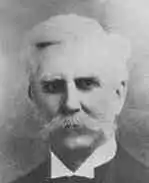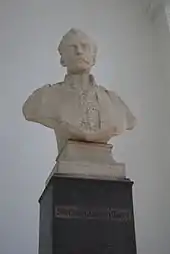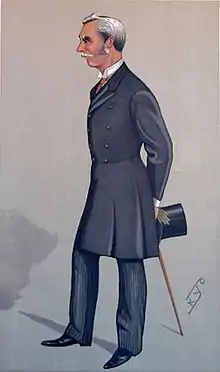Cecil Clementi Smith
Sir Cecil Clementi Smith GCMG PC (23 December 1840 – 6 February 1916),[1] was a British colonial administrator.
Cecil Clementi Smith | |
|---|---|
 | |
| 13th Governor of the Straits Settlements | |
| In office 17 October 1887 – 30 August 1893 | |
| Preceded by | Sir Frederick Weld |
| Succeeded by | William Edward Maxwell (acting) Sir Charles Mitchell |
| 4th Colonial Secretary of Straits Settlements | |
| In office 3 September 1878 – 17 November 1885 | |
| Monarch | Queen Victoria |
| Governor | William C. F. Robinson Edward Anson Sir Frederick Weld |
| Preceded by | Sir John Douglas |
| Succeeded by | Sir John Frederick Dickson |
| Colonial Treasurer of Hong Kong | |
| In office 13 November 1874 – 29 April 1878 | |
| Preceded by | Frederick Forth |
| Succeeded by | Sir James Russell |
| Personal details | |
| Born | 23 December 1840 London, England, United Kingdom |
| Died | 6 February 1916 (aged 75) Welwyn, Hertfordshire, England, United Kingdom |
| Spouse |
Teresa Alice Newcomen
(m. 1869–1916) |
| Children |
|
| Parents |
|
| Relatives | Cecil Clementi (nephew) |
| Education | Master of Arts |
| Alma mater | St Paul's School Corpus Christi College, Cambridge |
| Occupation | Colonial Administrator |
Background
The son of an Essex rector, John Smith, and his wife Cecilia Susanna Clementi (daughter of Muzio Clementi), Cecil Clementi Smith received his education at St Paul's School and Corpus Christi College, Cambridge.[2] In 1864 he began his civil service career as a cadet interpreter in Hong Kong, learning much about the Chinese culture and gradually became an accomplished scholar of the Chinese culture.[1] He was also the Colonial Treasurer of Hong Kong.
Civil Service

On 3 September 1878,[3] Clementi Smith took office in Singapore as a Colonial Secretary in the Straits Settlements, and understudied Governor Frederick Weld. His knowledge of Chinese culture and competence in the language proved useful as he was able to communicate effectively with leaders of the growing Chinese community.
Smith became known for his effective work in quelling Chinese secret societies in the Straits Settlements, such as those in Singapore which had been terrorising locals for decades. He also established the Queen's Scholarships in 1889 to fund bright Singaporean students to further their studies in top British universities.[1]
In 1887 he was appointed Governor of the Straits Settlements and High Commissioner to Malaya till 1893. A popular governor, the local Chinese community petitioned for a continuation of his appointment when he left Singapore in 1893.[1][4][5][6][7]
Subsequently, he was Lieutenant Governor of Ceylon, and the Master of the Mercers' Company in 1897. He was president of the commission of inquiry on the Trinidad riots in 1903, and was chief British delegate to International Opium Convention at The Hague in 1912.[8]
Family
Clementi Smith married Teresa Alice Newcomen in 1869, they had three children, Hubert (born …), Beatrice (born c. 1872) and Eustace (born c. 1879, and later a lieutenant colonel). Clementi Smith died in Welwyn, Hertfordshire, England, on 6 February 1916, aged 75.[9] His nephew was Sir Cecil Clementi who also served as Governor of the Straits Settlements and in other administrative positions in Hong Kong and Singapore.

Honours and awards
Clementi Smith was invested with Companion of the Order of St Michael and St George (CMG) in 1880,[10] Knight Commander of the Order of St Michael and St George (KCMG) in 1886[11] and Knight Grand Cross of the Order of St Michael and St George (GCMG) in 1892.[12]
He was also being appointed as Privy Counsellor in 1906.[13]
References
- Vernon Cornelius (2011), Cecil Clementi Smith, Singapore Infopedia, National Library Board, archived from the original on 26 July 2014.
- "Smith, Cecil Clementi (SMT859CC)". A Cambridge Alumni Database. University of Cambridge.
- "No. 24622". The London Gazette. 6 September 1878. p. 5037.
- "Farewell public banquet to H.E. the governor". The Singapore Free Press and Mercantile Advertiser. 24 August 1893. p. 2.
- "The farewell banquet to H.E. the Governor". The Straits Times. 24 August 1893. p. 2.
- "The farewell banquet to H.E. the Governor". The Straits Times. 24 August 1893. p. 3.
- "His Excellency Sir Cecil Clementi Smith". The Straits Times. 30 August 1893. p. 3.
- "INTERNATIONAL OPIUM CONVENTION SIGNED AT THE HAGUE JANUARY 23, 1912". 23 January 1912. Archived from the original on 25 January 2005.
- "Sir Clementi Smith dead". The Singapore Free Press and Mercantile Advertiser. 9 February 1916. p. 6..
- "No. 24848". The London Gazette. 28 May 1880. p. 3220.
- "No. 25592". The London Gazette. 29 May 1886. p. 2634.
- "No. 26238". The London Gazette. 1 January 1892. p. 1.
- "No. 27928". The London Gazette. 3 July 1906. p. 4545.
External links
- Singapore: Days of Old. A Special Commemorative History of Singapore Published on the 10th Anniversary of Singapore Tatler, Singapore: Illustrated Magazine Pub. Co., 1992, pp. 48–49, ISBN 978-962709319-0.
- Tate, D. J. M. (1988), A Portrait Gallery of Nineteenth Century Singapore, Singapore: Antiques of the Orient, ISBN 978-981-00-0668-6.
- Turnbull, C[onstance] M[ary] (1989), A History of Singapore, 1819–1988 (2nd ed.), Singapore: Oxford University Press, ISBN 978-0-19-588911-6.